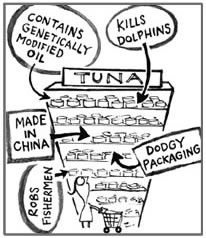How do we know that the toilet paper packet with the frog on it that says “soft on nature, soft on you” is actually good for the environment? It says it is 100% biodegradable, but isn’t all toilet paper biodegradable? It’s very white. Does that mean its been bleached with chlorine? It says the manufacturer has purchased a hectare of pristine rainforest but that doesn’t sound like much. It says the manufacturer has planted 4000 trees. Is that significant? And how come the same company still sells other types of toilet rolls that are not so good for the environment if they care so much for the environment?
says it is 100% biodegradable, but isn’t all toilet paper biodegradable? It’s very white. Does that mean its been bleached with chlorine? It says the manufacturer has purchased a hectare of pristine rainforest but that doesn’t sound like much. It says the manufacturer has planted 4000 trees. Is that significant? And how come the same company still sells other types of toilet rolls that are not so good for the environment if they care so much for the environment?
Should magazines be printed on chlorine-bleached paper contaminated with dioxin, even if it is recycled and recyclable? Or should they use dioxin-free paper from Europe, even though it is at the moment rarely recycled, and fossil fuels are used to transport it?
Other choices can be equally difficult. Green consumers tend to prefer natural fibres rather than synthetics, but the cotton industry and large-scale sheep grazing also result in significant environmental problems. The debates over whether plastic packaging is better or worse than paper packaging for the environment, or whether milk bottles are better than cartons, are sure to confuse consumers.
Something that is labelled biodegradable may take decades to break down or only break down in certain conditions, and even when it does biodegrade quickly it may leave the environment contaminated with its break down products.
 Sometimes the environmental damage associated with a product is controversial and it is hard for the consumer to know who is right. Take kangaroo meat. It is sold as “Good for you – good for the environment”. The packaging explained that this is because kangaroo meat has low fat content and kangaroos do less damage to the top soil, are better adapted to drought conditions, and produce less methane.
Sometimes the environmental damage associated with a product is controversial and it is hard for the consumer to know who is right. Take kangaroo meat. It is sold as “Good for you – good for the environment”. The packaging explained that this is because kangaroo meat has low fat content and kangaroos do less damage to the top soil, are better adapted to drought conditions, and produce less methane.
However kangaroos cannot be farmed. They have to be shot in the wild at night and this raises various health and humane concerns. Death may not be quick. Joeys can be orphaned and left to die or bashed to death by the shooter. Carcasses may be carried around for most of the night in a truck before being stored for days in less than optimum hygienic conditions. Opponents argue that the kangaroo meat industry could threaten population numbers of some species.
How is the average mum supposed to know whether kangaroo meat is indeed healthy and good for the environment?
Any judgement about whether a product is ecologically sustainable is extremely complex, requires long-term assessment from manufacture to disposal, and taking consideration of how long the product will last, whether it can be reused or recycled, whether it is biodegradable, how much energy it consumes and how efficiently it uses resources. Other matters that need to be considered include the way the product will be used, transported, distributed, marketed and packaged.
Few consumers arae in a position to do the research necessary to investigate each product thoroughly. What is more, the obvious hype surrounding green claims and their discrediting by environmental groups, has led many consumers to become sceptical of green marketing.